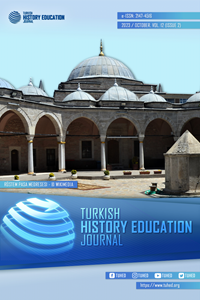Araştırma Articlesi
Translate
Issue Editorial Board

 0000-0003-3591-8180
0000-0003-3591-8180



 0000-0002-9481-2450
0000-0002-9481-2450

 0000-0003-2660-8009
0000-0003-2660-8009
Aim & Scope
Turkish History Education Journal (TUHED) publishes research, review, critical and translation articles. In this way, it aims to improve history education at all levels. It is an international, academic, peer-reviewed, non-profit, free-access, online journal.
The target audience of TUHED is academics, researchers, graduate students, and teachers.
TUHED is not committed to a single approach, discipline, methodology, or paradigm. It aims to develop the effective teaching of history, both locally and internationally. TUHED invites researchers and writers from different disciplines, who understand the importance of many disciplines, especially social sciences, to improve history teaching, to contribute to the journal.
Our journal accepts qualitative and quantitative empirical research, theoretical and conceptual analyzes, and publication critics on history education, history of education, and historiography.
Deadline for Submission of Manuscripts:
TUHED is published online twice a year, in May and October. Deadlines for submitting articles to our journal:
For the May issue April 15
For the October issue September 15
Article applications are not accepted outside of these dates!
Fee Policy:
The publication of articles and the execution of article processes in the journal are free of charge. No processing fee or submission fee is charged under any name for articles submitted to the journal or accepted for publication. TUHED also does not accept sponsorship and advertisement due to its publication policies. All expenses of the journal are borne by the real publisher. TUHED adopts free and open-access publication policies as it aims to increase the quantity and quality of studies in the field of publications. It also provides free and unlimited access to the articles it publishes.
The originality of Articles:
TUHED does not accept studies previously published elsewhere. However, sometimes it may treat articles published in a foreign language as "translation".
Type of Refereeing:
The “Double-blind peer review” method is used. The referees who evaluate the articles do not know the author, and the author of the article does not know the relevant referees.
Evaluation Process:
Each incoming article is first checked for compliance with the journal publication pattern and plagiarism. Eligible articles are evaluated by the editor-in-chief for originality, methodology, the importance of the topic, and the scope of the journal. It is then sent to the relevant editor. The editor ensures that the relevant article goes through a fair double-blind peer review. The candidate submits the article to at least two referees from the country and/or abroad. If the referees deem it necessary, the relevant editor approves the publication after the requested changes are made by the authors. Editors mediate all interactions between reviewers and authors. The author or the referee do not know each other under any circumstances.
Time in Review: Average 42 Days / 6 Weeks
Acceptance Rate:
Approximately 55% of the articles reaching TUHED were published. Nearly a quarter of all applications were rejected in the preliminary review before they were submitted for peer review.
COPE's Best Practice Principles:
TUHED adheres to high standards in publishing ethics. TUHED accepts the Principles of Transparency and Best Practices in Scientific Publications of COPE (Committee on Publication Ethics).
Plagiarism Prevention:
TUHED scans all submitted articles to prevent plagiarism. Whether there is plagiarism in the studies submitted for review is checked using TURNITIN and İntihal.net databases. The similarity rate is expected to be less than 20%. The main measure of similarity is that the author complies with the citation and citation rules. Even though the similarity rate is 1%, if the citation and citation are not duly made, plagiarism may still be in question. In this respect, citation and citation rules should be known by the author and should be applied carefully.
The following are seen as ethical violations:
Plagiarism,
Duplication,
False authorship/unaccepted authorship,
Research/data fabrication, Article slicing,
Broadcast by slicing,
Copyright infringement,
Concealing a conflict of interest.
All articles that do not comply with accepted ethical standards are removed from the publication. This includes articles with possible irregularities and inconsistencies detected after publication. To prevent this, the editorial board is the experts working in different subject areas of the journal (textbooks, museum education, teacher training, etc.). Thus, healthier progress and supervision are aimed at by assigning an editor and two referees who have worked on the relevant subject to the candidate article.
Correction, Withdrawal, Expression of Concern:
If the editors detect minor errors in the published article that do not affect the findings, comments, and conclusions, they may consider correcting and publishing it. Editors can return the article for major errors/violations that invalidate the findings and conclusions.
If there is a possibility that the authors may misuse the research or publication, the editors do not consider the manuscript. If there is evidence that the findings are unreliable and that the authors' institutions did not investigate the incident, or if the possible investigation seems unfair or inconclusive, the editors return the manuscript. COPE and ICJME guidelines are taken into account concerning correction, withdrawal, or expression of concern.
Professional sharing of the chief editor:
The editor-in-chief of TUHED is a member of İLESAM (Professional Association of Owners of Scientific and Literary Works), ÜNAK (Association of University and Research Librarians), and the Copyright Association. Communicates with other editors and publishers.
Retention of Referee Reports:
TUHED takes its task of scientific investigation very seriously. Our journal TUHED archives and preserves all the records of the article review process with the Dergipark infrastructure.
Citation Style:
Articles are expected to be prepared in accordance with the APA 6 System.
Abstract and Keywords:
Articles should contain abstracts of 200-250 words and 3-5 keywords to facilitate electronic search.
Authorship and Contribution:
After the article is sent to the journal for publication, the names of any of the authors cannot be removed and a new name cannot be added without the written consent of all authors. Also, the order of authors cannot be changed.
Contribution Rate Statement:
In the article, the contribution rate statement of the researchers, the support and acknowledgment statements, if any, and the conflict of interest statement are stated. You can download the MS Word template of the article, including the statement table, here.
Publication of Studies Based on Survey and Interview:
TUHED adopts the "Code of Conduct and Best Practice Guidelines for Journal Editors" and "Code of Conduct for Journal Publishers" of the Publication Ethics Committee (COPE) in order to create ethical assurance in scientific periodicals. In this context, the following points should be followed in the studies submitted to the journal:
• For research conducted in all branches of science that requires ethics committee approval (ethics committee approval should be obtained, this approval should be stated and documented in the article.
• In studies that require ethics committee permission, information about the permission (name of the committee, date, and number) in the method section, and also on one of the first/last pages of the article; In case of reports, information about signing the informed consent/consent form should be included in the article.
• Studies based on a statistical analysis of quantitative data will be approved by the statistics editor.
Special and Additional Issue Publication Procedure:
A special issue can be published in our journal once a year upon the request of the Editorial Board. All articles published in the abstract and supplementary issues are also subject to the double-blind peer review process.
Access to Full Texts:
TUHED is an open-access journal. Readers can access the full text of the journal without registering.
Subject Scope of the Journal:
- Studies covering history teaching methods, teaching materials, curriculum and textbook reviews, measurement and evaluation techniques
- Studies evaluating the history of history education on a local and international scale,
- Analyzes involving the work of leading historians, focusing on the problems in the field of historiography, historical methodology, and historiography,
- Research and compilation articles on world and Turkish education history,
- Critical criticism and translation studies on books, textbooks, and journal articles on history teaching, educational history, and historiography
Subject Category:
- Social Sciences: Education and Educational Research
- Social Sciences: Humanities, Joint Disciplines
LC Classification
- L7-991 Education (General)
- LA5-25 History of Education(General)
Keywords
History Teaching, History Education, History Didactic, Education History, History of History Teaching, Historiography
Language
The primary language of our journal is English (for research, review, critic and interview type articles) and the secondary language is Turkish (upon the request of the author(s) these works could be published both in English and Turkish languages).
All sections (Article title, Institution information and e-mail addresses of the authors, Abstract, Keywords, Full Text and Bibliography) are in English except for the names of the authors in the Research, Review, Critic and Interview studies.
The primary language in translation articles is Turkish.
Author Guidelines
TUHED invites all scholarly work to contribute to history didactic, history teaching, and history of history teaching written either in Turkish or English.
Please organize your manuscript prior to application in accordance with the TUHED Manuscript Template (Link). TUHED uses the Publication Manual of the American Psychological Association, 6th edition as a citation and referencing guide. Please see APA 6th edition for more information.
Submission Preparation Checklist:
As part of the submission process, authors are required to check off their submission's compliance with all of the following items, and submissions may be returned to authors that do not adhere to these guidelines.
• The submission has not been previously published in any other journal, nor submitted to another journal for publication consideration.
• The submission is original and written by the stated author(s).
• The submission is written either in Turkish or English.
• The submission file is in MS Word (.doc or .docx) format.
• Proofreading has been performed.
• Authors' identities (names, institutions, and address information) should be excluded from the first submission text.
• The manuscript should include min. 200 max. 250 words abstract followed by 5-7 keywords.
• The submission should not exceed 8.000 words (including abstract and bibliography).
Documents to be uploaded to the system:
During the first submission, the following files must be uploaded to the system:
1. Maximum 8000 words, Turkish or English full-text article formatted according to the TUHED Manuscript Template (Link). (Name, institution information, e-mail, ORCID number, and acknowledgment must be removed!)
2. Ethical Declaration & Copyright Transfer Form: If the study requires ethics committee approval, the relevant document (s) should be attached to the back of this form (as the 2nd and 3rd page) and uploaded to the system as a single PDF file. If a personal data collection tool or a copyrighted image is used, the copy of the written permission must be attached to this form as well.
3. (For the Applications in English) Certificate of Editing: This certificate has to be obtained from the relevant institutions showing that the proofreading has been performed on the English article.
For the articles accepted for publication after the peer-review process, the following files must be uploaded to the system:
a) Manuscripts in Turkish:
1. Full-text article in Turkish with a complete name, institution information, e-mail, ORCID number, and Acknowledge
2. Full-text article in English with a completed name, institution information, e-mail, ORCID number, and Acknowledge
3. Certificate of Editing: This certificate has to be obtained from the relevant institution, indicating proofreading has been performed on the English article.
b) Manuscripts in English:
1. Full-text article in English with a completed name, institution information, e-mail, ORCID number, Ethics Declaration, and Acknowledge.
Note:
1- ORCID number must be entered for all authors of the article.
2- The same author(s) can apply for at most one publication in a publication year (volume). The works of the author(s) who apply for more than one publication in the same year will be evaluated for publication in the next publication year (volume).
Guidelines for publication reviews and interviews:
Review and interview works should also be formatted in accordance with TUHED Manuscript Template in terms of layout and format, but sections and sub-titles can be edited by the authors in accordance with the content.
Guidelines for translation works:
This section aims to share with Turkish readers important works in the fields of history education/teaching or historiography published in Old Turkish or other languages. Your translation works should conform to the TUHED Manuscript Template in terms of layout and format, but chapters but sections, and sub-titles can be determined by the authors in accordance with the content.
For all translation/reprint submissions:
1. Authors have to obtain the required translation and reprint permission from the legal copyright holder. Permission documents should be uploaded system as an Appendix to the Ethical Declaration Form.
2. Translations should include the entire article/book chapter (without skipping any section, paragraph, or footnotes).
3. Make no adding to the main text, place the additional information, explanation, and critique belonging to the translator in the footnote section by adding the translator's note (TN) at the beginning of the sentence.
4. Submit the original version of the work as an Appendix to the translation text in image form.
Ethical Principles and Publication Policy
Our publication ethics and publication malpractice statement is mainly based on the Code of Conduct and Best-Practice Guidelines for Journal Editors1. Accordingly;
Publication Ethics may be defined as a self-regulatory mechanism insisting on integrity on the part of authors, peer reviewers, and publishers to establish higher standards of editorial processing”. Ethical standards for publication exist to ensure high-quality scientific publications, public trust in scientific findings, and that people receive credit for their ideas.
• Ethical researchers do not plagiarize.
• They do not misreport sources.
• They do not conceal objections that they cannot rebut.
• They do not caricature or distort opposing views.
• They do not destroy or conceal sources and data important for those who follow.
Peer-reviewed studies are the ones that support and materialize the scientific method. At this point, it is of utmost importance that all parties included in the publication process (authors, readers, researchers, publisher, reviewers, and editors) comply with the standards of ethical considerations. TUHED adheres to national and international standards on research and publication ethics. It complies with Press Law, Intellectual and Artistic Works Law, and Higher Education Institutions Scientific Research and Publication Ethics Directives. TUHED has adopted the International Ethical Publishing Principles published by the Committee on Publication Ethics (COPE), Directory of Open Access Journals (DOAJ), Open Access Scholarly Publishers Association (OASPA), and World Association of Medical Editors (WAME). It also undertakes to comply with the Decisions of the Turkey Editors' Workshop.
• Press Law (National Legislation)2
• Law on Intellectual and Artistic Works (National Legislation)3
• Higher Education Institutions Scientific Research and Publication Ethics Directive (National Legislation)4
• Transparency and Best Practices in Academic Publishing5
• Decisions of the Turkey Editors' Workshop (National Legislation)6
Duplicate Publication
Duplicate publication is the publication of the same or substantially similar papers in more than one journal. The editor returns the article unreviewed. After that, the editor may consider no articles by any of the authors for a period of time and may announce publicly in the journal (perhaps as a simultaneous announcement with the editor of the journal that published the earlier article) that the authors have submitted a previously published article, or may do any combination of these actions, at the editor’s discretion.
Simultaneous submission of manuscripts
Authors may not send the same manuscript to more than one journal simultaneously. If the editor learns of possible simultaneous submission, the editor reserves the right to consult with the other editor(s) who have received the article. Further, the editor may return the paper without review, or may reject it without regard to the reviews, or make this decision in discussion with the other editor(s) involved and may decide to consider no articles from the author from the authors for some time, and may also write to the author's employers, or may do any combination of these actions, at the editor’s discretion.
Publication Check for Plagiarism
In an instructional setting, plagiarism occurs when a writer deliberately uses someone else’s language, ideas, or other original (not common knowledge) material without acknowledging its source.
TUHED routinely screens article submissions for Plagiarism. The studies submitted for review are checked for plagiarism using the Ithenticate and Intihal.net software. The similarity rate is expected to be less than 20%. The main measure of similarity is that the author complies with the citation and citation rules. Even though the similarity rate is 1%, if the citation and citation are not duly made, plagiarism may still be in question. In this respect, citation and citation rules should be known and carefully applied by the author:
All submitted manuscripts to the journal are scanned for similarity via Turnitin to prevent plagiarism. Plagiarism, duplication, false authorship/denied authorship, research/data fabrication, article slicing, copyright infringement, and concealment of conflict of interest are considered unethical behaviors. All articles that do not comply with accepted ethical standards are removed from the publication. This includes articles with possible irregularities and inconsistencies detected after publication.
Data fabrication and falsification
Data fabrication means the researcher did not actually do the study but made up data. Data falsification means the researcher did the experiment but then changed some of the data. Both of these practices make people distrust scientists. If the public is mistrustful of science, then it will be less willing to provide funding support.
Human participants
TUHED respects the principle of protecting participant privacy and the personal and sensitive data of participants. Therefore, it requires ethical committee approval for all research conducted with human participants.
Dealing with allegations of research misconduct
TUHED abides by the Ethics Toolkit for a Successful Editorial Office7. TUHED and its editors; will take reasonable steps to prevent the publication of papers where plagiarism, citation manipulation, data tampering, data fabrication, and other research misconduct have occurred. In no case will TUHED, or its editors knowingly allow such misconduct to occur. If TUHED and its editors are aware of any allegations of research misconduct related to an article published in their journal, they will follow COPE’s Ethical Principles Flow Chart8.
Complaints
Should you encounter any unethical act or content in the journal apart from the ethical responsibilities listed above, please notify the journal by e-mail at: editortuhed@gmail.com
Correction, Withdrawal, Expression of Concern
Editors may consider issuing a correction if minor errors are detected in the published article that do not affect the findings, comments, and conclusions. Editors should consider retracting the article in case of major errors/violations that invalidate the findings and conclusions. If there is a possibility of misuse of research or publication by the authors; If there is evidence that the findings are unreliable and that the authors' institutions did not investigate the incident, or if the potential investigation seems unfair or inconclusive, editors should consider issuing a statement of concern. COPE and ICJME guidelines are taken into account with regard to correction, withdrawal or expression of concern.
Publication of Studies Based on Survey and Interview
TUHED adopts the principles of the Editorial Ethics Committee (COPE) “Code of Conduct and Best Practice Guidelines for Journal Editors” and “Code of Conduct for Journal Publishers” in order to establish ethical assurance in scientific periodicals. In this context, the following points should be followed in the studies submitted to the journal:
1) For research conducted in all branches of science that requires ethics committee approval an ethics committee approval should be obtained and this approval should be stated and documented in the article.
2) In research that requires ethics committee permission, information about the permission (name of the committee, date and number) on the first page of the article as well as in the method section; In case reports, information about signing the informed consent/consent form should be included in the article.
Special Issue Publishing Policy
A special issue can be published in our journal once a year upon the request of the Editorial Board. Articles sent for inclusion in a special issue are first subjected to editorial review. Then it is examined in terms of compliance with the writing rules of the journal and similarity is scanned to prevent plagiarism. After these stages, it is taken into the peer review process in which the double-blind model is used.
Editorial Confidentiality Obligation
The editors of TUHED treat all submitted manuscripts as confidential documents; this means that they will not disclose information about an article to anyone without the permission of the authors. During the article review process, the following people can access the articles: Editors, Reviewers, Editorial Board Members. The only situation in which details about a manuscript may be passed on to a third party without the consent of the authors is if the editor suspects serious research misconduct.
Principles of the Peer-Review Process for the Work of the Editorial Staff
Editorial articles written by TUHED editors are not subject to external referee evaluation. Original research articles, on the other hand, are sent to at least two external referees within the scope of double blind reviewing. During this period, the roles of those editors are suspended.
Allegations-Suspects of Scientific Misconduct
Scientific misconduct has different definitions. We address these issues on a case-by-case basis, while following the guidance established by the major editorial ethics bodies. If the editor suspects an ethical violation or if there is an alleged violation, they are obliged to take action. This task covers both published and unpublished articles. The editor should not simply reject articles that raise concerns about potential abuse. Ethically, it is obliged to follow the alleged lawsuits. The editor should follow the COPE flowcharts where appropriate. Editors should first seek a response from anyone suspected of misconduct. If they are not satisfied with the answer, they should ask the relevant employers or institution to investigate. The editor should use all reasonable efforts to ensure that an appropriate investigation into the alleged misconduct is carried out; if this does not happen, the editor should make all reasonable attempts to persist in finding a solution to the problem. This is an arduous but important task.
TUHED conforms to COPE's Ethics Toolkit for a Successful Editorial. TUHED editors; will take action to prevent the publication of articles in which plagiarism, citation manipulation, data tampering, data fabrication, and other research misconduct occur. In no event will TUHED or its editors knowingly allow such abuse to occur. If the editors of TUHED become aware of any allegations of research misconduct related to an article published in their journal, they will follow COPE's guidelines regarding the allegations.
Reviewers should notify the Editor when they suspect research or publication misconduct. The editor is responsible for carrying out the necessary actions by following the COPE recommendations.
TUHED undertakes to apply it to COPE flow charts when faced with allegations of misconduct in the following or similar matters.
• What to do when rebroadcast is suspected
• What to do when plagiarism is suspected
• What to do when fabricated data is suspected
• What to do in requests for change of authorship
• What to do when an undisclosed conflict of interest is suspected
• What to do when unfair or gift authorship is suspected
• What to do when an ethical problem is suspected in an article
• Ethical violation suspected e-mail, etc. What to do when notified directly with
• Announcement of suspected ethical violation via social media
Principles of Research Ethics
TUHED adheres to the highest standards in research ethics and follows the principles of international research ethics as defined below. The authors are responsible for the compliance of the manuscripts with the ethical rules.
• Principles of integrity, quality, and transparency should be sustained in designing the research, reviewing the design, and conducting the research.
• The research team and participants should be fully informed about the research's aim, methods, possible uses and requirements, and risks of participation in the research.
• The confidentiality of the information provided by the research participants and the confidentiality of the respondents should be ensured. The research should be designed to protect the autonomy and dignity of the participants.
• Research participants should participate in the research voluntarily, not under any coercion.
• Any possible harm to participants must be avoided. The research should be planned in such a way that the participants are not at risk.
• The independence of research must be clear, and any conflict of interest must be disclosed.
• In experimental studies with human subjects, written informed consent from the participants who decide to participate in the research must be obtained. In the case of children and those under wardship or with confirmed insanity, the legal custodian’s assent must be obtained.
• If the study is to be carried out in any institution or organization, approval must be obtained from this institution or organization.
• In studies with the human subject, it must be noted in the method section of the manuscript that the informed consent of the participants and ethics committee approval from the institution where the study has been conducted have been obtained.
ETHICAL RESPONSIBILITIES
a) Editors' Responsibilities:
- The editor is responsible for deciding which of the papers submitted to the journal will be published. The editor will evaluate manuscripts without regard to the authors' race, gender, sexual orientation, religious belief, ethnic origin, citizenship, or political philosophy. The decision will be based on the paper’s importance, originality and clarity, and the study’s validity and its relevance to the journal's scope. Current legal requirements regarding libel, copyright infringement, and plagiarism should also be considered.
- The editor and any editorial staff must not disclose any information about a submitted manuscript to anyone other than the corresponding author, reviewers, potential reviewers, other editorial advisers, and the publisher, as appropriate.
- Unpublished materials disclosed in a submitted paper will not be used by the editor or the members of the editorial board for their own research purposes without the author's explicit written consent.
b) Reviewers' Responsibilities:
- The peer-reviewing process assists the editor and the editorial board in making editorial decisions and may also serve the author in improving the paper.
- Any selected referee who feels unqualified to review the research reported in a manuscript or knows that its prompt review will be impossible should notify the editor and withdraw from the review process.
- Any manuscripts received for review must be treated as confidential documents. They must not be disclosed to or discussed with others except as authorized by the editor.
- Reviews should be conducted objectively. Personal criticism of the author is inappropriate. Referees should express their views clearly with supporting arguments.
- Reviewers should identify cases in which relevant published work referred to in the paper has not been cited in the reference section. They should point out whether observations or arguments derived from other publications are accompanied by the respective source. Reviewers will notify the editor of any substantial similarity or overlap between the manuscript under consideration and any other published paper of which they have personal knowledge.
- Privileged information or ideas obtained through peer review must be kept confidential and not used for personal advantage. Reviewers should not consider manuscripts in which they have conflicts of interest resulting from competitive, collaborative, or other relationships or connections with any of the authors, companies, or institutions associated with the papers.
c) Authors' Responsibilities:
- Authors of original research reports should present an accurate account of the work performed as well as an objective discussion of its significance. Underlying data should be represented accurately in the paper. A paper should contain sufficient detail and references to permit others to replicate the work. Fraudulent or knowingly inaccurate statements constitute unethical behavior and are
unacceptable. - Authors could be asked to provide the raw data of their study together with the paper for editorial review and should be prepared to make the data publicly available if practicable. In any event, authors should ensure accessibility of such data to other competent professionals for at least ten years after publication (preferably via an institutional or subject-based data repository or other data
center), provided that the confidentiality of the participants can be protected and legal rights concerning proprietary data do not preclude their release. - Authors will submit only entirely original works, and will appropriately cite or quote the work and/or words of others. Publications that have been influential in determining the nature of the reported work should also be cited.
- In general, papers describing essentially the same research should not be published in more than one journal. Submitting the same paper to more than one journal constitutes unethical publishing behavior and is unacceptable. Manuscripts that have been published as copyrighted material elsewhere cannot be submitted. In addition, manuscripts under review by the journal should not be resubmitted to copyrighted publications. However, by submitting a manuscript, the author(s) retains the rights to the published material. In case of publication, they permit the use of their work under a CC-BY license [http://creativecommons.org/licenses/by/3.0/], which allows others to copy, distribute and transmit the work as well as to adapt the work and to make commercial use of it.
- Authorship should be limited to those who have made a significant contribution to the conception, design, execution, or interpretation of the reported study. All those who have made significant contributions should be listed as co-authors. The corresponding author ensures that all contributing co-authors and no uninvolved persons are included in the author list. The corresponding author will also verify that all co-authors have approved the final version of the paper and have agreed to its submission for publication.
- All authors should include a statement disclosing any financial or other substantive conflicts of interest that may be construed to influence the results or interpretation of their manuscript. All sources of financial support for the project should be disclosed.
- When an author discovers a significant error or inaccuracy in his/her own published work, it is the author’s obligation to promptly notify the journal editor or publisher and to cooperate with the editor to retract or correct the paper in form of an erratum.
d) Publisher's Responsibilities:
- The Publisher undertakes to create an independent editorial decision.
- The Publisher accepts that the editors are responsible for all processes of the works submitted to TUHED. In this context, it does not interfere with the decisions of the editors for economic, political or personal interests.
- The Publisher protects the property and copyright of the articles published in TUHED and undertakes to keep a record of every published copy.
- The Publisher has the responsibility to take precautions against all kinds of scientific abuse, citation fraud and plagiarism regarding the editors.
References:
1. Committee on Publication Ethics (COPE). (2011, March 7). Code of Conduct and Best-Practice Guidelines for Journal Editors. Retrieved from
http://publicationethics.org/files/Code_of_conduct_for_journal_editors_Mar11.pdf
2. https://www.mevzuat.gov.tr/mevzuatmetin/1.5.5187.pdf
3. https://www.mevzuat.gov.tr/mevzuatmetin/1.3.5846.pdf
4. https://www.yok.gov.tr/Sayfalar/Kurumsal/mevzuat/bilimsel-arastirma-ve-etik-yonetmeligi.aspx
5. https://doi.org/10.24318/cope.2019.1.12
6. https://editorlercalistayi.com/
7. https://publicationethics.org/files/cope-ethics-toolkit-journal-editors-publishers.pdf
8. https://publicationethics.org/files/cope-ethics-toolkit-journal-editors-publishers.pdf
Price Policy
Within the Budapest Open Access Initiative framework TUHED supports the idea of knowledge sharing for free and without interference. For this purpose all expenses of TUHED journal are covered by the publisher. Turkish History Education Journal does not require any subscription, submission, evaluation or publication (APC) fee or any other type of payment for accessing and/or using electronic information sources.
ANNOUNCEMENTS:
1- APA7 Referencing Style:
As of May 2024, TUHED will follow APA 7 (American Psychological Association) style for referencing and citation. For more information, please refer to the TUHED template and writting guidelines.
2- Early Release:
According to the TUHED's new publication policy, the articles which have completed the evaluation process will be published online-first. It will no longer be necessary for manuscripts to wait until the “next issue”. Early Release articles will receive an international identification code (DOI), and identified page numbers.
3- Ethics Committee Approval:
In accordance with the ULAKBİM decision of 25 February 2020, Ethics Committee Approval must be obtained for studies on people (without age restrictions), this approval must be specified in the Method section of the article and signed Ethics Committee Approval must be uploaded to the system. Applications that do not meet these requirements will not be considered for publication.
4- New Publication Policy
Beginning from Spring 2021 issue TUHED will require all Turkish manuscripts to contain a full-text English translation. Manuscripts submitted in Turkish will be requested to have full-text English translation if they are accepted for publication after the review process.
Turkish History Education Journal site and its metadata are licensed under a Creative Commons Attribution-NonCommercial 4.0 International License
Permissions beyond the scope of this license is available at COPYRIGHT

